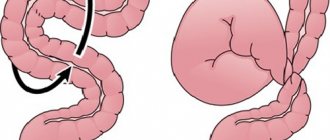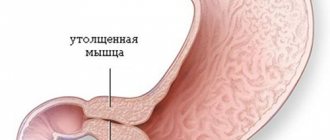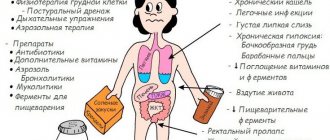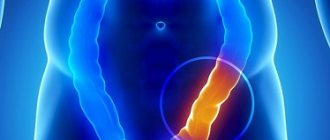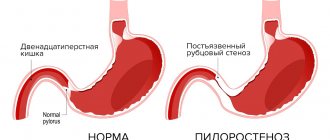Constipation often accompanies the course of the malignant process, especially in the terminal - the last 4 stages of cancer. In some situations, it signals extremely unfavorable complications of the disease, but more often it is a natural chronic consequence of the hardships of life for a cancer patient.
Constipation is possible in young and old, all victims are united by one desire - to never experience this condition again, world statistics clarify - symptoms are observed in 12%-19% of adults, but only occasionally.
What can be called constipation?
Each person has his own rhythm of defecation - bowel movements. Some people do this every day and at the “classic” time - in the morning, while others have bowel movements every few days. The rate of formation and volume of feces expelled primarily depends on the mass of dietary fiber consumed.
For meat-eating Europeans, the standard is indicated as 200 grams daily, for Africans - 450 grams twice a day, but this is similar to the “average temperature in the hospital.” Having a bowel movement every third day cannot be considered abnormal unless it causes suffering.
There are 7 criteria for true constipation and at least two must be present simultaneously:
- Rarity of defecation
- The need for prolonged straining to expel stool
- Hard stool like “nuts” or with dense fragments
- Unpleasant feeling of incomplete emptying
- Feeling of obstruction in the rectum
- The need to “pick out”, which is scientifically called “manipulation”
- Defecation less than three times a week.
To make a diagnosis, the specific Rome criteria require that symptoms occur in every fourth bowel movement and last longer than 3 months.
Causes of constipation in cancer patients
Not all people can determine the exact cause of defecation disorders, even after a thorough examination; experts identify three mechanisms of constipation:
- Slow movement of feces;
- Imbalance of contraction and relaxation of the muscles responsible for defecation - their dyssynergism;
- Dyskinesia due to disease of the colon.
In a cancer patient, all three mechanisms may be present at once; they most often result in:
- narrowing of the intestinal lumen by carcinoma or compression by tumor nodes from the outside;
- disruption of innervation and damage to the pelvic floor muscles in malignant processes of the pelvic organs;
- taking medications that affect motility or damage the intestinal mucosa;
- nutritional disorders due to inadequate nutrition;
- complications of chemotherapy - neurotoxicity of platinum derivatives and taxanes;
- endocrine disorders during long-term hormonal therapy;
- significant decrease in physical activity.
Don’t be shy about complaining about irregularities and dissatisfaction with the bowel movement process, because banal bowel retention may hide a fatal complication, make an appointment.
Help for cancer patients with constipation
Constipation is a slow, difficult or systematically insufficient bowel movement. Since the normal frequency of stool varies widely - from 1-2 times a day to 2-3 times a week, it is difficult to give a clearer definition. In any case, lack of satisfaction after bowel movements or a feeling of fullness in the intestines are integral signs of constipation.
Constipation occurs due to disruption of the processes of formation and movement of intestinal contents, a disturbance caused by changes in intestinal motor function, changes in the width of the intestinal lumen and the volume of feces. Disturbances in intestinal motility can be caused by neurogenic causes, inflammation, changes in hormonal regulation, toxic effects, physical inactivity, etc. Inhibition of the urge to defecate is purely psychogenic in nature.
In cancer patients, causes of constipation may include:
- narrowing of the intestinal lumen due to a tumor or compression of the intestine from the outside by tumor nodes of the abdominal cavity (mechanical constipation);
- disruption of the nervous regulation of motor function when using neurotoxic chemotherapy drugs - vinca alkaloids, navelbine, platinum drugs, taxanes - or when the mucous membrane is damaged by cytostatics (toxic constipation);
- depression (neurogenic constipation);
- inflammatory diseases (enteritis, colitis);
- prolonged stay in bed, sedentary lifestyle (hypodynamic constipation);
- taking hormonal medications, suppression of ovarian function in breast cancer, decreased production of thyroid hormones when the thyroid gland is removed (endocrine constipation);
- loss of fluid due to diarrhea, fever, forced diuresis ( taking diuretics
), ascites (
constipation due to impaired water-electrolyte metabolism
); - change in nutrition with a decrease in coarse fiber, diet (nutritional constipation).
Constipation causes not only pain and a feeling of fullness in the abdomen, but also nausea, belching, bloating (flatulence), mood changes for the worse, sleep is disturbed, performance decreases, the skin loses its elasticity and turns yellow. Difficulty in defecation leads to hemorrhoids and damage to the anal mucosa. With chronic constipation, diseases not only of the intestines, but also of the entire gastrointestinal tract are aggravated.
Therapeutic tactics depend on the type of constipation and include treatment of the disease that led to constipation. But they always start with changing the diet (increasing the amount of fiber and liquid, fermented milk products, juices, prunes, dried apricots, figs, etc.) and developing the habit of emptying the intestines at a certain time. It is useful to drink a glass of fruit juice on an empty stomach ( for example, plum, peach, apricot
) and after half an hour, induce defecation by rhythmically retracting the anus, circular massage of the abdominal wall, and finally, you can take the “eagle pose.” If the attempt fails, you can introduce a glycerin suppository. Increasing the amount of fiber consumed in food is contraindicated when the intestinal lumen is narrowed.
Laxatives should be used very carefully, under the supervision of a physician and in short courses. Some groups of laxatives (for example, lactulose) cause an increase in the volume of intestinal contents due to water, which is unsafe in case of narrowed intestines or complications of antitumor therapy. Other laxatives, when used for a long time, lead to intestinal atony (lack of peristaltic movements), which further aggravates the suffering. In general, laxatives are only good for treating acute constipation. For chronic patients, it is better to use petroleum jelly, which penetrates into the thickness of the stool, diluting it, or enemas with cold water (warm water is absorbed) and vegetable oil, as well as glycerin suppositories.
Constipation in colon cancer
Transverse colon carcinoma, by its very presence, affects intestinal function, changing its peristalsis. As a rule, patients complain of discomfort, bloating and alternating constipation with loose stools.
A dangerous complication of the disease is intestinal obstruction due to partial and then complete blocking of the lumen of the intestinal tube by the tumor.
Patients suffering from carcinoma do not pay attention to the abnormality of the bowel movement, considering it a natural symptom of the disease. Nevertheless, episodes of stool retention in combination with difficult passage of gases with a “drum” abdomen and increasing abdominal pain are evidence of increasing obstruction, which is still compensated.
A three-day absence of stool with no passage of intestinal gases with a progressive deterioration of the condition is a reason for an urgent visit to an oncologist with suspicion of subcompensation of intestinal function. These manifestations for more than three days with an increasingly worsening condition, an increase in symptoms of intoxication, severe pain and vomiting, most likely indicate a complete blockage of the intestinal lumen. The consequences are fatal if you skip urgent medical attention.
Diagnostic methods in Medscan
The Medscan diagnostic center implements a comprehensive approach to the problem of constipation in oncology - intestinal dysfunction, pain and other unpleasant symptoms. Using high-precision equipment and the experience of our specialists, we will establish a final diagnosis and draw up an individual treatment plan within the optimal time frame.
Diagnosis begins with examination of the abdomen and abdominal wall. Digital examination of the rectum will help determine the nature of the stool (hardness and consistency of stool), intracavitary formation, scarring or narrowing in the anal area.
Medscan uses the following methods:
- Laboratory tests of blood and urine. With their help, tumor markers can be detected and inflammatory processes in organisms can be determined.
- X-ray examination reveals a tumor.
- Ultrasound, CT, MRI are more accurate methods that allow visualization of small neoplasms and metastatic foci.
- Immunohistochemistry. The interaction of antigen-antibody immune complexes provides a complete characteristic of a malignant neoplasm.
According to the doctor's indications, the patient may be prescribed a number of additional research methods.
Constipation in colorectal cancer
One of the most important signs of rectal carcinoma is uneven stool, either constipation or diarrhea, with dissatisfaction with the act due to seemingly incomplete emptying.
The rectum is a well-extensible ampoule, the capacity of the tube is very impressive and reaches 20 cm in the largest diameter. Therefore, obstruction is an infrequent manifestation of the disease, but constipation will be caused by dyssynergism of the muscles involved in the cancerous conglomerate and metastases to the lymph nodes along the neurovascular bundles.
Insufficiency of secretion production by glandular cells with inflammation accompanying the tumor and post-radiation changes add to the chances of stool compaction.
Possible causes of intestinal obstruction
Dynamic obstruction is a condition in which there is no physical obstacle to the movement of intestinal contents. Stagnation occurs due to paresis (immobilization) of the intestinal wall.
The cessation of intestinal peristalsis can lead to:
- irradiation of the intestinal wall;
- concomitant diseases - atherosclerosis of intestinal vessels, diabetes mellitus, renal or liver failure, spinal cord diseases.
Dynamic intestinal obstruction can develop in the first 2-3 days after surgery to remove the prostate gland. This is one of the body’s reactions to intervention, which is quite easily corrected with drug therapy.
Mechanical obstruction is a condition when the movement of intestinal contents is stopped by a mechanical obstruction. It can be:
- prostate cancer metastases to the intestine;
- adhesions that formed after previous operations;
- combination of prostate cancer and colon cancer.
The prostate tumor itself, even when reaching a large size, extremely rarely puts pressure on the rectum.
Constipation in stomach cancer
Gastric carcinoma disrupts the function of the gastrointestinal tract, but after removal of part or all of the stomach, patients often complain of loose stools. Constipation is promoted by the neurotoxicity of chemotherapy, which includes nerve-damaging platinum derivatives and taxanes. A very severe complication of chemotherapy - intestinal paresis with the absence of peristalsis is clinically manifested by symptoms similar to obstruction, but with the release of gases.
With peritoneal carcinomatosis or intraperitoneal metastases, especially with ascites, symptoms of partial obstruction of the intestinal tube with subcompensated obstruction come to the fore.
Most cancer patients are not helped by taking laxatives and increasing physical activity; treating constipation in a cancer patient is a multidisciplinary task that requires the participation of an oncologist and proctologist, a nutritionist and a clinical pharmacologist. A banal phenomenon in a cancer patient may hide the progression of the disease; Euroonco will help resolve this problem.
Book a consultation 24 hours a day
+7+7+78
Bibliography
- Achkasov E.E., P.A.V., Alekperov S.F., Shkoda A.S., Belyaev L.B., Volkov V.S., Krutilina O.V., Kalachev O.A. / Classification of obstructive colonic obstruction of tumor origin // Coloproctology; 2009; 3.
- Karlov A.V., Orlova N.V., Parfenov A.I./Dyssynergic defecation is one of the causes of chronic constipation// Ter. Archive; 2015; 87(4).
- Terzi´c, J.; Grivennikov, S.; Karin, E.; Karin, M. /Inflammation and colon cancer// Gastroenterology; 2010; 138.
- De Salvo G.L., Gava C., Lise M. et al. /Curative surgery for obstruction from primary left colorectal carcinoma: Primary or staged resection// The Cochrane Database of Systematic Reviews; 2006; Issue 2.
- Glynne-Jones R., Tan D., Goh V. /Pelvic MRI for guiding treatment decisions in rectal cancer// Oncology; 2014; T. 28; No. 8.
- Rectal cancer: ESMO Clinical Practice Guidelines for diagnosis, treatment and follow-up //Annals of oncology; 2013;T. 24; supple 6.
Drug treatment
Drug therapy is effective in the treatment of dynamic intestinal obstruction. For tumor metastases to the intestine, drug treatment is performed as preoperative preparation. Therapy is carried out in a hospital setting and always under the supervision of a surgeon.
Drug treatment may include:
- intravenous administration of saline solutions to restore water-salt balance in the body;
- infusion of plasma replacement solutions;
- administration of antispasmodics - drugs that eliminate intestinal spasms;
- antibiotic therapy - to reduce the degree of inflammation;
- administration of drugs that help restore intestinal motility (in case of dynamic obstruction).

